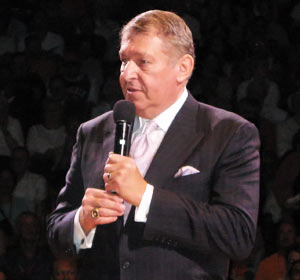By Paul M. Banks
Jerry Colangelo is a sports mogul. He’s the former owner of the Phoenix Suns, Phoenix Mercury of the WNBA, Arizona Rattlers of the Arena Football League and the Arizona Diamondbacks. He was instrumental in the relocation of the Winnipeg Jets to become the Phoenix Coyotes, who are now in bankruptcy. (and rumored to be soon owned by Chicago Bulls/White Sox Chairman Jerry Reinsdorf.)
Colangelo has been named the NBA’s Executive of the Year four times (1976, 1981, 1989, 1993). On April 4, 2004, Colangelo was elected to the Naismith Basketball Hall of Fame.
Last month he visited Chicago as the National Association of Basketball Coaches (NABC) Foundation held their inaugural “Court of Honor Gala” at Union Station. The Gala celebrated the achievements and contributions of Jerry Colangelo, chairman of the Suns and managing director of the USA Basketball senior national team from 2005-2008. Colangelo, a Chicago native and University of Illinois graduate, assembled the 2008 U.S. Olympic team, coached by another Chicagoan, Duke University coach Mike Krzyzewski.
Colangelo and Krzyzewski guided the “Redeem Team” to Olympic gold in Beijing this past summer. At the Gala, Coach K. presented Colagelo with this “lifetime achievement” award. I caught up to him at the gala where both his speech and his interview answers provided the media numerous insights on life in the NBA and basketball in general.
Colangelo was born and raised in one of the roughest suburbs of Chicago (Yes, it may sound a bit oxymoronic to describe a suburb as being socio-economically depressed, but I’m from a suburb that’s quite close, and trust me Chicago Heights is not a place where you walk late at night by yourself) The SICA native, repped the S-I-C-A and reaffirmed his rags-to-riches story:
“So when I look here and I see so many friends and people I’ve competed with and against, it’s a humbling experience. It’s the only way to describe it and sometimes you pinch yourself and say did this really all happen? I’m still the kid from Chicago Heights. But I guess it did and it helps to put it in proper perspective…To start out where I did and end up where I am now is truly living the American dream,” Colangelo said.
Jerry then answered inquiries about residing at the top of the basketball pantheon and accepting his award in the windy city.
“This is a fraternity, it’s a fraternity of a lot of the people who have the same passion for a game, for a sport in particular, for a city I was asked where would I want this event to take place and I said Chicago, it’s where I’m from these are my roots and it’s a great gathering spot, it’s a very exciting time,” he responded before answering a question about his involvement in the push to get Chicago the next Summer Olympic games which are still up for grabs.
“Well I’m on the 2016 committee and I’m doing everything I can to be of help. I was here with the IOC members, and it would be very easy for people to say well Jerry, you’re prejudice, but I’ve seen Rio de Janiero, I’ve seen Tokyo and Madrid, I’ve seen plans of all the cities and there’d be no better host than Chicago. It’d be a great place to have it and I’m hopeful and prayerful that we get it because it should happen,” Jerry said
Today, we have a president who plays basketball and who filled out a very well-publicized bracket during March Madness. Colangelo articulated how far the sport has come since its inception as a time-filler between baseball and football season.
“Thank goodness somebody needed to find something between football and baseball season, the thing that really surprises me is that it took them 6 months to cut the bottom of the basket because they got tired of going up with a ladder to take the ball out of the basket. And it’s had such an effect on the lives of so many people in this room. The game of basketball has opened up so many doors and introduced me to so many people and experiences that I would not have otherwise had,” Colangelo expressed.
He also spoke about the equal opportunities provided in basketball (provided you’re much taller than the population at large or course)…
“Let’s grow this game together on all levels because there’s lessons we can learn from it. It balances the playing field, it doesn’t matter where you come from, what neighborhood you come from, what color, what means of life, it’s the great equalizer once you get on the court and you lace ‘em up, that’s what it all about, the competition,” Colangelo said.


